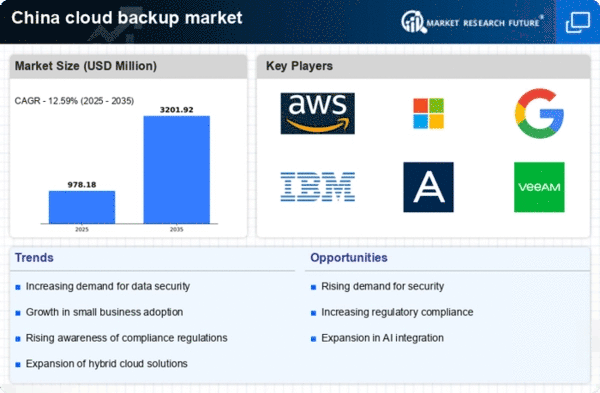Growing Trend of Remote Work
The cloud backup market in China is significantly impacted by the growing trend of remote work, which has become increasingly prevalent in recent years. As organizations adapt to flexible work arrangements, the need for accessible and secure data storage solutions has intensified. In 2025, it is projected that remote work will account for over 30% of the workforce in China, necessitating reliable cloud backup services to support remote operations. This shift has prompted businesses to invest in cloud technologies that facilitate seamless access to data while ensuring its protection. The cloud backup market is thus likely to benefit from this trend, as companies seek to enhance their operational resilience and maintain productivity in a remote work environment.
Increased Cybersecurity Threats
The cloud backup market in China is experiencing heightened demand due to the increasing prevalence of cybersecurity threats. As cyberattacks become more sophisticated, organizations are recognizing the critical importance of safeguarding their data. In 2025, it is estimated that cybercrime could cost businesses in China upwards of $150 billion annually, underscoring the urgency for effective data protection strategies. Consequently, companies are turning to cloud backup solutions as a means to mitigate risks associated with data breaches and ransomware attacks. The cloud backup market is thus positioned to thrive as businesses prioritize cybersecurity measures, seeking reliable backup solutions to ensure data recovery and continuity in the face of potential threats.
Emergence of Advanced Technologies
The cloud backup market in China is witnessing transformative changes due to the emergence of advanced technologies such as artificial intelligence and machine learning. These technologies are enhancing the capabilities of cloud backup solutions, enabling more efficient data management and recovery processes. In 2025, it is anticipated that AI-driven cloud services will account for a substantial portion of the market, as organizations seek to leverage automation for improved operational efficiency. The cloud backup market is poised to capitalize on this trend, as businesses increasingly adopt innovative solutions that streamline backup processes and enhance data security. This technological evolution is likely to reshape the landscape of cloud backup services in China.
Government Initiatives and Regulations
The cloud backup market in China is significantly influenced by government initiatives aimed at enhancing data security and promoting digital transformation. Recent regulations mandate that businesses implement robust data protection measures, thereby increasing the reliance on cloud backup solutions. The Chinese government has introduced policies that encourage the adoption of cloud technologies, with an emphasis on safeguarding sensitive information. As a result, organizations are compelled to invest in cloud backup services to comply with these regulations. The cloud backup market is likely to see accelerated growth as companies align their strategies with governmental directives, ensuring that they meet compliance standards while leveraging the benefits of cloud technology.
Rising Demand for Data Storage Solutions
The cloud backup market in China experiences a notable surge in demand for data storage solutions, driven by the exponential growth of data generation across various sectors. As businesses increasingly rely on digital platforms, the need for secure and scalable storage options becomes paramount. In 2025, the data storage market in China is projected to reach approximately $10 billion, indicating a robust growth trajectory. This demand is further fueled by the proliferation of IoT devices and the increasing volume of data produced by enterprises. Consequently, organizations are seeking reliable cloud backup solutions to ensure data integrity and availability. The cloud backup market is thus positioned to benefit from this trend, as companies prioritize efficient data management strategies to support their operational needs.
















